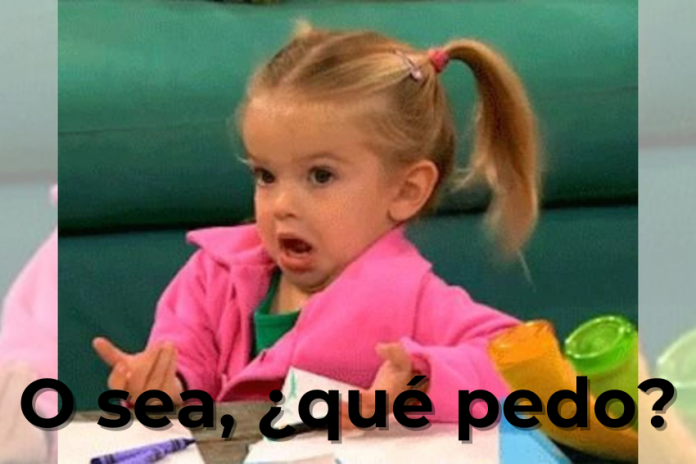What the heck? Or, do I mean, what fart — ¿qué pedo?
“Pedo” is one word in Spanish that showcases the complexity of Mexican vocabulary. While originally associated with flatulence, in Mexico, this versatile term has taken on a variety of meanings, making it a linguistic curiosity worth exploring.
“Pedo” in Mexico is a linguistic chameleon, adapting easily to various contexts, so let’s dive into its usage in different situations.
Difficulty or problem
In Mexico, “pedo” is often used colloquially to refer to a difficulty or problem. For example, someone might say, “es un pedo” when they want to express that something is a real problem or a rather difficult task to complete. You’ll also hear “me metí en un pedo,” which translates as “I’m in trouble.”
Fight or conflict
“Pedo” can also signify a conflict or fight. If someone mentions being in a “pedo,” they might be describing a heated argument or altercation. For instance, “anoche, hubo un pedo en el bar” — It went down at the bar last night.
“Hacerla de pedo,” on the other hand, means making a stink or giving someone a hard time — “se pasó un rojo y el poli se la hizo de pedo” (he ran a red and the cop gave him a hard time about it).
Describing someone or something
Another common usage of “pedo” in Mexico is to describe being drunk or intoxicated. Saying “estaba bien pedo anoche” — I was really drunk last night — or “estoy medio peda” — I’m a bit tipsy — is a casual way to convey the state you’re in. On the other hand, the word “peda,” is used to describe a party or a night out with heavy drinking, which comes from this sense of pedo “estuvo buena la peda” (the party was great/last night was great).
You can call someone “mal pedo” to show that they’re a mean person, while a situation described with the same term is a bad one. Lost your keys? “Qué mal pedo!” Conversely, a good-natured person or a fortunate situation can be described as “buen pedo.” In English you can say an exceptionally good movie or meal was “something else” — in Mexican Spanish, it’s “otro pedo.”
View this post on Instagram
Possibilities
If someone says, “ni pedo” they’re expressing resignation in regards to a situation, in the same way an English speaker sighs “oh well.” But when adding the preposition “de,” the meaning changes to “there’s no way!” — ¡ni de pedo! — hinting that the speaker wouldn’t do what they’re being asked even if they were drunk.
Greetings and expressions of surprise
In some cases, “pedo” is used as an expression of surprise or disbelief. For example, upon hearing unexpected news, someone might exclaim, “no mames, en serio? ¡Qué pedo!” (No way, seriously? What a surprise!), or “qué pedo, qué pasó?” (What is going on?). In addition, it is a very common way to greet your friends just by saying “Qué pedo!”
Understanding the various uses of the word “pedo” will add depth to your comprehension of Mexican Spanish. It’s essential to consider the context in which the term is used to grasp its intended meaning fully, and you should always keep in mind that it is an informal word. Don’t use it with your parents, your in-laws, your teachers or any person to whom you would normally speak in a formal way. Save it for your very close friends.
Paulina Gerez is a translator-interpreter, content creator, and founder of Crack The Code, a series of online courses focused on languages. Through her social media, she helps people see learning a language from another perspective through her fun experiences. Instagram: paulinagerezm / Tiktok: paugerez3 / YT: paulina gerez
